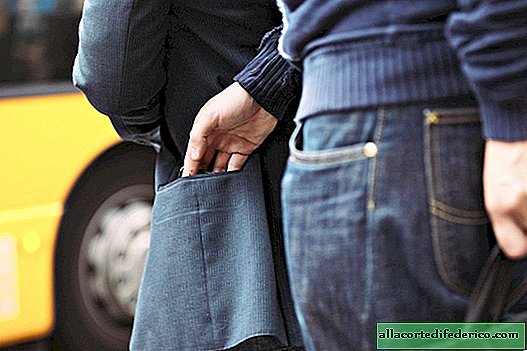11 most common types of travel fraud and how to avoid them
Overpriced airfare is not the only factor in travel that separates you from hard-earned money. There are many options to lose money on a trip, as they say, in broad daylight and out of the blue. We have collected 11 of the most common types of fraud victims of which are travelers, and we will tell you how not to be among those who are unlucky to be deceived.
Pickpockets

Pickpockets are everywhere! Beware of strangers who run into you on the sidewalk or who “accidentally” spill cappuccino on you in a crowded area. In addition, pay attention to motorcyclists and scooter guys: these guys can hide behind the horizon with your bag or wallet in no time.
How to avoid: Protecting yourself from pickpockets is quite difficult. But at least you should always put your wallet and phone in the front inner pocket, and women should keep their handbags closed and not throw them behind their backs.
Fake tickets
Are you offered tickets for a show, bus or museum at an incredibly competitive price? Most likely, these pieces of paper are an ordinary fake.
How to avoid: Very simple. Always buy theater, museum, train or bus tickets from authorized sellers only!
Taxi
A taxi driver refuses to turn on the meter or claims that it does not work in order to tear off your payment at a rate that is eight times more than the prescribed value. It happens that after turning on the counter, the driver simply travels in circles, hoping that you will not notice that you just drove the same area three times, but on different lanes. And you, most likely, not knowing the city well enough, and will not notice!
How to avoid: Discuss your route with one of the locals before you pick up a taxi, and negotiate the fare before getting in the car so that the driver cannot raise the price when he brings you to your destination. If there is a meter in the car, make sure it turns on when you get in a taxi.
Scam with surrender
Sometimes taxi drivers begin to assure you that they simply have nothing to give you back and, with the help of such a trick, get paid in the amount of almost a double tariff.
How to avoid: In order not to fall prey to such a trick, always carry enough small bills with you.
Need help with your luggage?
You do not have time to get out of the airport terminal, as a good Samaritan grabs your luggage and offers to help you deliver it directly to the bus. But this has nothing to do with the sincere desire for gratuitous help, because after that you will require a considerable tip.
How to avoid: Immediately explain that you yourself will carry your bags and are not going to pay for this service. If you still need the help of a porter, discuss the price in advance.
Roadside robbery
If you happen to be on the highway and another is coming close to your car, and its driver asks to lower the window and reports that you have a flat tire (or there are some other problems) with the car, immediately offering your help, click on the gas. Most likely, this man planned to rob you right on the side of the road.
How to avoid: Do not pay attention to such comments if you have no serious reason to doubt the serviceability and safety of the car. Obvious malfunctions, most likely, you would notice yourself.
Designer (read: fake) anything

Are trendy designer bags, glasses or jewelry sold at noticeably lower prices than in your hometown (or country)? This is a lie! Think a hundred times before giving away money for a "by Gucci" bag.
How to avoid: Another “too good to be true” situation. If you are not embarrassed that this product is a fake and probably very low-quality, then just buy it. Just remember that buying original Ray-Ban glasses for $ 10 is not possible.
ATM skimmers
In other words, these are readers of cards inserted into the ATM, which copy data from the magnetic strip, while the hidden video camera captures the PIN code you dialed. Detecting this system is quite difficult, because it is invisible to the naked eye.
How to avoid: The simplest solution is to use ATMs located inside banks and use your hand to cover the PIN you enter.
Currency fraud
Sellers will try to cheat on you. Many times. Even after you carefully counted and checked the amount that you are going to give for a brand new hookah, the seller will most likely tell you that you have underpaid. Orienting quickly in currency exchange and calculating is quite difficult.
How to avoid: Understanding currency exchange and prices is necessary before you go to the market for shopping. Count the money aloud in front of the seller to prevent him from claiming that you miscalculated. Do not show the seller the full amount of money you have.
Children are asking for money

A child asking for a pretty penny is a sight, of course, not for the faint of heart, but that’s how gypsy scammers work. As a rule, gypsies send their children to beg.
How to avoid: If you can’t just ignore these kids, instead of money, offer to buy them a sandwich or some hot food.
Fake police
We are taught to trust the police, which makes us easy prey for scammers abroad. Often in tourist areas, criminals, dressed as police officers, can ask for your documents and wallet, explaining that they are investigating a case, for example, of fake bills or checks. Or they may claim that something is wrong with your visa and claim a fine.
How to avoid: If you are told about a visa error, offer to solve this problem at the police station. Never give your things to anyone until a person provides you with their identification number and name. Just in case, study in detail what the police uniform looks like in the country where you are going.

















